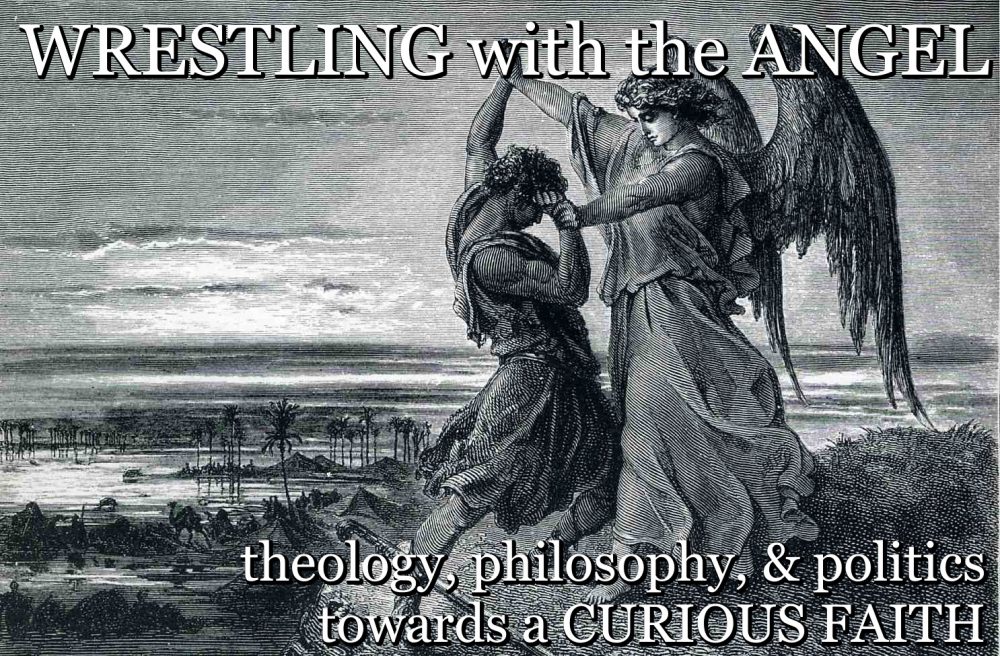 It is often commented that the religious impulse is a manifestation of the human desire to find meaning in all experience, even that experience that is fundamentally meaningless. Evolutionary psychologists, for example, will claim that our distant ancestors faced so much danger from predators (and perhaps also from each other) that highly cautious, borderline paranoid behavior was selected for over the generations. Imagine, for example, that a prehistoric hominid heard a rustling in the bushes. Maybe it’s a hungry lion, or maybe it’s just an aggravated squirrel. Evolution might favor the person who assumes the worst and runs, since, even if they’re wrong, this will only result in a few wasted calories. Meanwhile, the person who sits easy and assumes no danger will pay a much higher price if they are mistaken.
It is often commented that the religious impulse is a manifestation of the human desire to find meaning in all experience, even that experience that is fundamentally meaningless. Evolutionary psychologists, for example, will claim that our distant ancestors faced so much danger from predators (and perhaps also from each other) that highly cautious, borderline paranoid behavior was selected for over the generations. Imagine, for example, that a prehistoric hominid heard a rustling in the bushes. Maybe it’s a hungry lion, or maybe it’s just an aggravated squirrel. Evolution might favor the person who assumes the worst and runs, since, even if they’re wrong, this will only result in a few wasted calories. Meanwhile, the person who sits easy and assumes no danger will pay a much higher price if they are mistaken.
The modern reasoning goes that this cognitive bias towards assuming that noises in the night must be caused by some powerful agent eventually led to human religiosity–we began to see agency in the movement of stars, in the timing of volcanic eruptions, and in the forming of storms. This explanation for religion, of course, forms a powerful basis for critiquing and rejecting spiritual and religious practice. After all, if human religion is nothing more than the fanciful products of over-active imaginations (or paranoia), then perhaps it is something better left behind in the dustbin of history.
But is this account of human religion convincing? Does it account for the variety of spiritual systems and the full range of religious philosophies developed by, and spiritual practices of, religious humans? This is a question of great breadth and depth that touches on a range of disciplines–psychology, sociology, history, and evolutionary biology, to name only a few–but I want to offer a response from a Christian theological perspective here.
First, I want to argue that this account gets at least some things right. I think it offers a (partial but nonetheless) powerful explanation for some religious tendencies and practices. Second, though, I want to argue that its true value can only be recognized once one recognizes its limitations, and I want to suggest that this account misses at least as much as it captures.
What is perhaps most interesting from a Christian theological perspective is that this modern account of human religion actually accords with traditional Jewish and Christian accounts of polytheistic faiths, especially those of the “pagan” peoples around them. Jews and Christians alike frequently mocked and derided what they saw as superstition among other Middle-Eastern and European peoples. Augustine, for example, spends a decent chunk of his Confessions making fun of astrology; the Biblical prophets often took an opportunity to laugh at people foolish enough to worship images carved in stone and wood. In both cases, Jewish and Christian thought seems to recognize that humans have a desire to control the future and their surroundings, and they also attempt to anthropomorphize matter around them in an attempt to bargain with the forces determining their lives.
In that sense, then, although evolutionary psychology may be a recent development, the basic critique of religion outlined above is not only not new, but it’s not even necessarily anti-religious across the board. It can be deployed by some religions against others, depending on their exact features. This brings us to the second point I’d like to make: this “explanation” of religion gives us a better understanding of some traditions than it does of others. To see why, consider this short example:
Imagine you are walking along a beach on a desert island. You’ve been living there for years and never found any trace of another human being. But today, as you walk along the tide-line, you see something shining in the water, bobbing up and down. As you approach, you realize it’s a bottle, and, as you pick it up, you see a small note folded up inside. A message in a bottle! You had heard of such things back before being stranded on this island, but you never expected to find one yourself. Excited, you pull the cork, reach inside, and pull the letter out. It is thin and fragile, clearly it’s been floating in the oceans for decades. As you unfold the note, you find not an endearing message in cursive, but a block of printed letters with no spaces. Try as you might, you can’t find any words spelled throughout the text. The letters appear to be completely random.
Now, if you really struggled and tried, and developed some complex scheme, you might be able to convince yourself that, actually, this is some kind of code. Over time, you might be able to develop a cipher which would allow you to “decode” the block of letters. Of course, since you could craft this cipher at your leisure, you could make it as complex and arbitrary as necessary to make the text say whatever you liked. If you wanted an encouraging message, you could “discover” than in the text. If you wanted to a romantic message, you could make that happen as well.
Now, here is where the evolutionary psychological critique outlined above would kick in and explain your behavior: we humans are wired to see messages and agency everywhere, even when there isn’t one, and so the “messages” you discovered were, in fact, constructions of your own mind. And, in this case, they’d be right.
But this isn’t the end of the story. Even if you admitted to yourself, after many years of trying to believe that there really was a message there for you, that the block of letters was random and arbitrary, the bottle and its contents would not lose their curiousness. Stepping back from the meaning of the note, you might begin to ask different questions. Even if the note itself is just a random series of letters, how did it get into the bottle? And why was the bottle dropped into the ocean? The shape of the ink on the page might be random and meaningless, but it’s hard to believe that it got into the bottle, with cork on top, and then into the ocean through purely random events. The best explanation is that someone intentionally put a meaningless note into a bottle, and intentionally put that bottle into the ocean.
Why would they do such a thing? In asking this question, the same impulse that you had when you were trying to decode the note is at play, and yet here it is not so easily dismissed. In fact, this new question might weigh even more heavily on you than the previous one. Why would someone go through the trouble of getting this note into a bottle if the note itself meant nothing? Does the bottle mean something? Did the process of putting the bottle into the ocean mean something?
In these two different kind of questions–the meaning of the note, on the one hand, and the meaning of the note’s presence in the bottle, on the other–we see models for two different kinds of religious and spiritual thinking. One kind of common human religiosity sees the gods as beings in the world who have control over specific phenomena–a god of the sea, a goddess of the crops, etc. For this kind of religion, the shape of entrails as they fall from a goat, or the size of a flock of birds overhead, means something. And it is this kind of religiosity that is susceptible to the evolutionary psychological explanation–trying to see a human-like agency in phenomena that are probably arbitrary, or caused by sequences of events that are nothing like human thought.
But in asking about the message-in-the-bottle’s existence in general, a different kind of religiosity is on display. Here, it is not the shape of the goat’s entrails or the size of a flock of birds that necessarily says something–it’s the fact that goats and birds and the whole cosmos exists at all that says something. This question–“why is there something instead of nothing?”–superficially resembles the questions behind polytheism and divination–“why do volcanoes erupt? why did my family not have more children?”–but in essence it is a radically different question. It is not an attempt to explain particular aspects of the world with superstition. It is not, that is, an attempt to do pre-scientific pseudo-science. Instead, it is an attempt to secure the foundations of knowing and being in general. It seeks to understand how it could be that science is even possible, that being is even extant.
Religion in this form–and I include here at the very least the great Abrahamic and Indic traditions, though I am sure other currents of human thought, both religious and philosophical, also fall into this category–is not so easily explained away. Any mature thinker who carefully considers the strange facticity of the immediacy of existence will find themselves gazing at that bottle and wondering questions that lie beyond the mind’s grasp. Another way of saying all of this is that some religious traditions and practices are focused on content, and others on form. Religious practices that try to explain particulars–volcanoes, the seasons, the dark spots on the moon–are the former. Meanwhile, religious thought that asks about the genesis of the cosmos, of the meaning of time and space themselves, of the possibility of causality and meaning in any sense fall into the latter. (It bears mentioning that while I think dividing religious traditions between these two broad trends is useful, there is clearly also overlap: some “pagan” communities eventually developed sophisticated and robust philosophical systems, and many members of Abrahamic and Indic religions–Christianity very much included–often fell back into self-serving superstition.)
The main point I hope can be taken away from this is that words like “religion” and “god” are not homogeneous, single-reference signifiers. It is a foolish errand to try and explain the genesis of religion through one very neat causality, because what you are trying to explain is incredibly complex. Likewise, the distinction between a “god” and “God” cannot be over-stated. Seeking to understand why sometimes the waves are calm and other times violent is simply not the same as wondering what and why being is. The former is, at its core, a scientific question, and we moderns (and postmoderns?) are right to leave behind superstitious answers. The latter, however, is a question seeking the foundations of any possible thought, science included, and is a philosophical question as relevant today as it ever was.
So, I say: religion is dead; long live religion! Let us leave behind not only superstition but also false confidence in simplistic explanations. Let us stop, sit, and consider ourselves clearly. What sits in the mirror is, after all, a defiant mystery.

 “God” is not an answer, but a question.
“God” is not an answer, but a question. In a
In a  Critics of Christianity and Christian
Critics of Christianity and Christian  So each of us individually, and groups of us as communities, find ourselves attempting to adjudicate various truth-claims, many of which rest on differing assumptions, according to a blended set of axioms and logics, which are often actually rather obscure–that is to say, we often reason without being conscious of the rules according to which we reason. If and when we attempt to reflect on our own processes of reasoning, we find an intellectual mine-field, in which we have to employ the very criteria we wish to observe and study in our studies and observations. Reasoning about reasoning ends up resembling the unfortunate
So each of us individually, and groups of us as communities, find ourselves attempting to adjudicate various truth-claims, many of which rest on differing assumptions, according to a blended set of axioms and logics, which are often actually rather obscure–that is to say, we often reason without being conscious of the rules according to which we reason. If and when we attempt to reflect on our own processes of reasoning, we find an intellectual mine-field, in which we have to employ the very criteria we wish to observe and study in our studies and observations. Reasoning about reasoning ends up resembling the unfortunate  Perhaps the clearest way of pointing to this general system of thought is to appeal to the very opening of the Hebrew Bible. In Genesis chapter one, the cosmos in general and humanity in particular are pronounced “good”; indeed, we humans are said to be made “in the image of God”, the imago Dei. This is not a reference to our bodily form, but rather to our intellectual, moral, and/or spiritual nature and capacities. The upshot of the first creation story, the very opening of Jewish and Christian Scripture, is that reality has not only a descriptive content, but a moral or valuative one as well: it is good.
Perhaps the clearest way of pointing to this general system of thought is to appeal to the very opening of the Hebrew Bible. In Genesis chapter one, the cosmos in general and humanity in particular are pronounced “good”; indeed, we humans are said to be made “in the image of God”, the imago Dei. This is not a reference to our bodily form, but rather to our intellectual, moral, and/or spiritual nature and capacities. The upshot of the first creation story, the very opening of Jewish and Christian Scripture, is that reality has not only a descriptive content, but a moral or valuative one as well: it is good. Jason Evans penned a
Jason Evans penned a 


